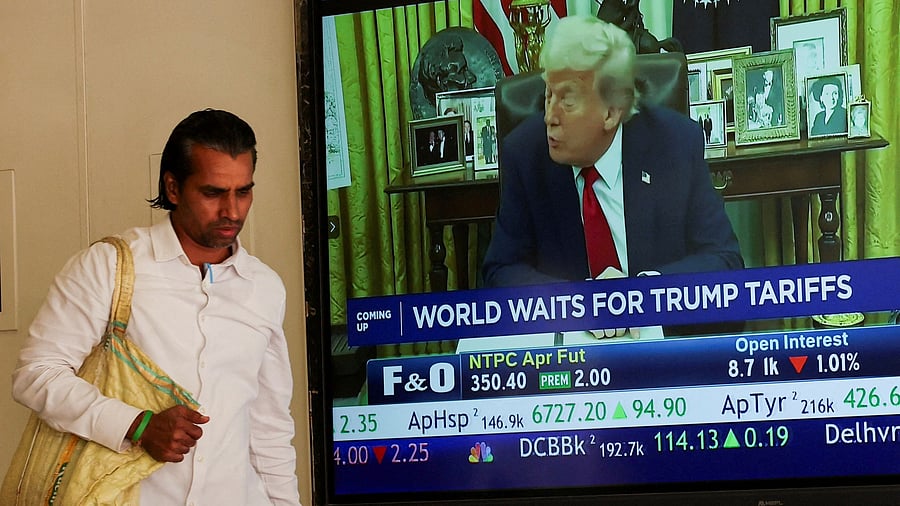
A man walks past a screen displaying US President Donald Trump, at the Bombay Stock Exchange (BSE) ahead of Trump's tariff plans, in Mumbai.
Credit: Reuters Photo
This week, ongoing uncertainty around trade negotiations is expected to keep Indian markets in consolidation mode. Given the weak start to the earnings season, markets are likely to remain volatile due to stock-specific factors. President Donald Trump’s plan to impose blanket tariffs of 15% or 20% on most trade partners adds to the cautious sentiment. Investors will focus on key domestic macro data, including CPI and WPI inflation, while tracking Q1 earnings and updates on the India–US trade deal.
The Nifty50 ended last week with a 1.2% loss at 25,150, marking its second straight weekly decline amid cautious investor sentiment driven by tariff deadline uncertainties and weak global cues. Broader markets also slipped, with the Nifty Midcap 100 and Smallcap 100 down 1.7% and 1.4%, respectively. Sector-wise, Nifty IT fell 3.8% following weak TCS results, while the auto sector declined 2% amid profit-booking due to Tesla’s formal entry into India with its first Mumbai showroom scheduled to open this week. The Nifty Metal Index dropped 2% due to US-imposed tariffs on copper imports.
FMCG was the only gainer, rising 2.2% on healthy pre-quarterly updates. In addition, AMC stocks gained post strong AMFI’s June data, with Mutual Funds’ Monthly Average AUM rising about 4% month-on-month, over 22% year=on-year, led by equity. With SEBI proposing relaxed norms allowing AMCs to manage pooled non-broad-based funds without a PMS license, investor optimism in capital markets is likely to persist.
After the SEBI barred US-based quant firm Jane Street from local markets, last week, for alleged manipulation of index levels, the former will continue tightening surveillance of the derivatives market but is not considering curbing weekly index expiries at this stage. However, it may still revisit the structure of expiries, and may analyze weekly vs monthly expiry losses in detail.
TCS kicked off Q1FY26 earnings season with a disappointing performance, putting pressure on the IT sector.
On the trade front, the extended deadline for the India-US mini deal has added to uncertainty, leading to consolidation in the markets. President Donald Trump last week, announced tariffs on 15 countries ranging between 20%-50% effective August 1. A 35% tariff on goods from Bangladesh has been imposed, creating an opportunity for Indian textile companies to gain US market share amid rising export costs for Bangladesh. A 50% tariff on copper imports in the US will take effect from August 1, 2025. Meanwhile, concerns in the pharma sector eased as the US deferred the planned 200% tariffs on pharmaceutical imports by 12–18 months.
In the coming week, investors will continue to be focused on the quarterly earnings with results of companies like HCL Tech, HDFC Life, ICICI Pru, Indian Hotels and Tech Mahindra amongst many lined up for this week leading to stock specific reactions in the market.
(The writer is Head of Research, Wealth Management, Motilal Oswal Financial Services Ltd)